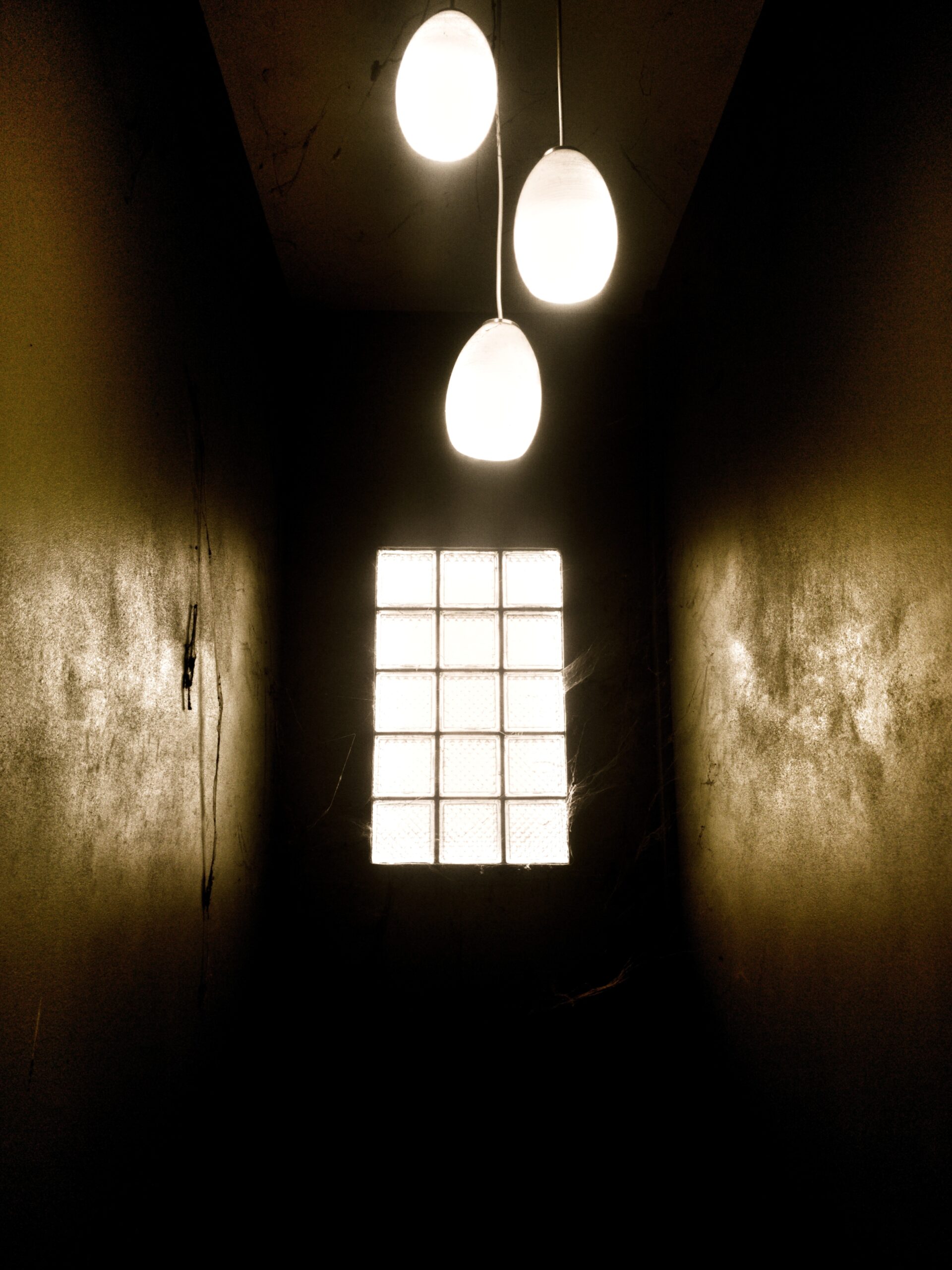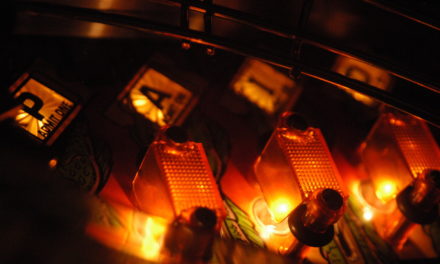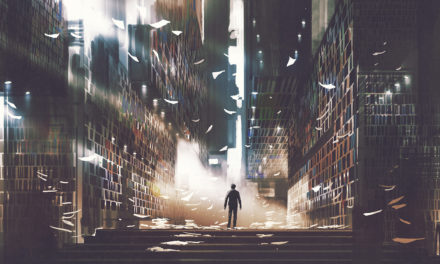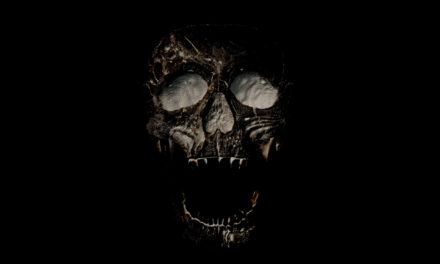Rent Control
by Harrison Demchick
Issue 14: Megacity | 4,114 words

window in the dark attic, © Tok /Adobe Stock
On a particularly strange morning one Saturday in the middle of April, Mary found herself standing outside the door to the eighth floor in her six-story building.
She readjusted the whale-patterned tote bag on her shoulder and squinted at the sign affixed to the white brick beside the doorframe. Then she glanced back over the rail at the distance she had traveled. Her mind had been occupied—she knew that. Choosing the stairs over the elevator, as she always did when she couldn’t make it to the gym, she’d hefted her farmer’s market acquisitions up the steps ruminating on the rent hike notice in her inbox, the mercenary practices by which greedy landlords like Xavier could raise rents, how desperately she did not want to move for the third time in five years, and, by a train of thought she couldn’t recall, whether her cat Leroy would look good in polka dots. This explained why she hadn’t noticed when she skipped past the fourth floor on which she lived.
It did not explain how there was an eighth floor.
In equal measure, it did not explain how the stairwell continued upwards after.
She might have turned around then—slipped back down the stairs, made her way back to apartment 409 to spend the next few hours convincing herself it was a prank or a sign of something unsavory in the empanada she’d bought and eaten downstairs—but instead, because it seemed the thing to do, she turned the latch and opened the door, stepping onto the eighth floor.
The eighth floor looked much like the fourth floor. It had the same firm copper carpet and the same inoffensively gray walls, though the paint was chipping just a little around the edges. And if there were any lingering suspicion that the sign in the stairwell had been altered, it vanished at the sight of the 8s heading each apartment number on the doors she passed.
Mary walked down the hall on a tightrope between curiosity and alarm, listening for sounds through the doors: a footstep here and a shuffle of furniture there, a crying baby and the futile pleas of an overwhelmed dad. She caught a whiff of spaghetti sauce as she passed the elevator lobby, which housed two elevators bearing the same silver doors she knew from every other floor.
Around the bend, she kept to the right of an older woman walking what looked to be a sickly dog, little and bony with a patch of brown fur missing at the distended lower bulge of its belly. The woman regarded Mary suspiciously as she passed, and when Mary looked back over her shoulder she found that the woman had stopped, keeping a close watch through square-framed glasses. The dog whimpered. Mary continued down the hall.
There were no surprises down this last corridor, but Mary still felt a deep unease by the time she reached the opposite stairwell. Her fingers clutched tightly to the strap of the tote bag, which, though hardly full—only four apples and a loaf of rosemary bread—was starting to press upon her collarbone. She found herself more and more certain that the thing to do was to head back home, where she could chalk up the entire experience to whatever she could rationalize between now and whenever Yelena returned.
But when she opened the door to the stairwell she found the stairs did not go down. Only up.
Her heart fluttered a little. She looked up in the space between the rails and tried to find the ceiling, but the awkward angle narrowed her view; she couldn’t see it.
Mary should have turned around and returned to the other stairwell. Rationally, she knew this. Still, she soon found herself dragging her tote bag up the stairs to what the sign by the next door identified, helpfully, as the ninth floor. She kept going, reaching the tenth floor, the eleventh, the twelfth. Lingering at the twelfth-floor landing, she leaned over the rail to look up again and still could not see the ceiling she knew had to be there.
Finally, she pushed down the latch and made her way onto the twelfth floor.
The first thing she noticed was the people. The otherwise identical hallway was bustling with them, filling the space like a residential Bronx back alley a century past. A chubby man in an undershirt and red suspenders hung pants from a clothing line running the short distance from one side of the hall to the other. A pair of dirty-haired children dashed under it, giggling in the thrill of the chase. Many of the doors were open, and the smells hit her in waves: the must of a gerbil cage, the earthen rot of boiling potatoes.
Slowly, cautiously, Mary made her way down the hall.
Where the woman on floor eight had watched her closely, the residents of floor twelve seemed determined to avert their gaze. Their eyes lolled away as she neared, falling toward sauce stains in the carpet or little cracks in the ceiling, but they did not step aside or walk away. Instead, they went about their lives with the air of unshakeable routine, unperturbed by their residence on the twelfth floor of a six-story building.
As Mary skirted past them she noticed their skin had just a hint of a green hue and a texture down the throat or around the ears that registered as almost gelatinous—as if it would give if she pressed a finger against it.
At the corner, where the crowd began to thin out, she turned down the hallway. A couple doors ahead, a teen girl sat against the wall and spoke into a bar of soap as if it were a phone. Farther down were a man and a woman who appeared to be conversing and laughing, but as Mary neared, it became evident that neither was speaking at all.
Then at the next corner, there was a face Mary recognized.
“Justin?” said Mary.
Justin was standing by the cracked open door to apartment 1213, his body hunched and fingers dangling awkwardly, his eyes fixed lazily on some spot past his toes. He swayed a little, like a stalk of grain in a breezy field. His usually neat mid-length brown hair was now a little mussed, and there was a sickly coat of sweat on his forehead.
He glanced up, the response on satellite delay.
“Hey,” he said.
Justin had been a neighbor at one point—he lived two floors down and one unit over. They talked on occasion when they bumped into each other in the courtyard or at the farmer’s market. He was a coordinator; Mary could not recall of what. He would wear old white sneakers and once spoke of a brother in Anchorage.
But then he’d moved out. She was fairly sure of it.
She asked him about it.
He looked puzzled for a moment, rubbing his nose absently with the pad of his index finger. The skin surrounding the nostril flattened like putty. “Oh yeah,” he said, finally. “I think I was going to. But then I got here.” He scratched his head. “Rent’s not bad.”
“How, though?”
A flake from his scalp drifted snow-like toward the floor. His eyes seemed to follow it, but a half step behind. Eventually he shrugged.
Mary regarded him warily, a heavy fluttering filling the top of her chest where her voice was supposed to be. She swallowed it back.
“How—how many are there?” she said. “Floors, I mean. In this building.”
After a moment, Justin rubbed his finger against his nose again. His nose dented inward. It took too long to right itself.
“Six, I think,” he said. “Right?”
“Can I see your apartment?” Mary could see very little through the crack in the door. Little more than the wall, really, with a hint of green-black creeping upward like moss. When she looked back over her shoulder, the couple down the hall were still chatting in absolute silence.
Justin rubbed his nose. “I think you probably shouldn’t,” he said.
“Why are you here?”
Something popped somewhere. A sour odor emerged that Mary could not place.
Justin shrugged. “Rent’s not bad.”
He rubbed his finger against his nose, and his nose fell off.
Mary barreled past him around the corner to the elevator lobby. Her fingers and toes tingling, she hurried to the panel and pressed her finger against the down button, trying to ignore the little brown cat curled up in the corner and with more legs than a cat ought to have. She pressed the button again, then again. She heard the machinery working behind the dulled silver doors but couldn’t tell if the elevator was getting any closer.
When she glanced left, Justin was still there. He stared at her blankly. He held his nose in his left hand.
Her stomach flipped, and she charged down the hall toward the second stairwell, trying her best to ignore the old man with the unlit cigar and the little girl in ballet tights bunny-hopping in a single yellowed spot on the floor. But she could not miss the window at the end of the hall, which should have framed a higher-up view of the very same town houses and traffic as the window on the fourth floor. Instead it was a foamy haze of endless white.
She thought she saw something swimming in it.
She opened the door and flung herself into the stairwell.
Breathing heavily in the long, cold cement chamber, where she again found no stairs going down, Mary realized she was still holding her tote. She lowered it to the floor, where it landed with a squish she did not expect. After a moment, warily, she reached into the bag and emerged with an apple. It was black and rotten.
Mary screeched and dropped the bag and apple to the floor. The apple rolled mushily along the landing before casting itself over the edge.
Despite her spinning head and rabbit breaths, Mary had the presence of mind to listen for the thud.
It did not come.
So she lowered herself slowly to the floor and took a minute to put the pieces together. The stairs did not go down, but clearly there was a down. That was good. That was something. If she could find a stairway heading down, it had to reach floor six eventually, right? And then five. And then four.
Mary scooted forward on the landing until she was beside the tote bag and looked down and saw what she thought might be another landing. She contemplated whether she was strong enough to hold tightly to the rail and lower herself down. She wasn’t very athletic. No upper body strength. Like a toddler, according to her high school gym teacher.
She again peered up in search of the ceiling that had to reveal itself eventually. Between steps and rails and concrete, she simply could not see it.
Her eyes fell, dropping down level by level until they landed on the tote bag. She gave it a mostly useless kick and then, with a grunt, climbed back to her feet. As her heart slowed, she gripped the railing and sought her bearings. Maybe if she backtracked exactly the way she came, she would find again the stairs that led her to the eighth floor to begin with. But she wasn’t ready to face what she’d seen in the hallway. And that left only one option.
Mary girded herself, abandoned the produce, and continued up the stairs.
Floor thirteen. Fourteen. Fifteen.
Craning her neck to look up past the landing, Mary still saw nothing that resembled a ceiling.
Sixteen. Seventeen. Eighteen.
Her footsteps echoed across and up and down the concrete walls. She heard the hum of machinery in the distance, though whether it was the air conditioning or the elevators or something else altogether, she could not tell. As she climbed, she recognized for the first time the wear in her calves, tugging tight with each step. She had been walking for a very long while.
Nineteen. Twenty. Twenty-one.
She finally stopped. Before her was a door very much like all the other doors on all the other floors that should never have been there in the first place. Same cold gray paint. Same font for the floor number posted on the adjacent brick wall.
With a long, low sigh, Mary turned the latch and stepped into the hallway.
This floor was quiet. Once the reverberations of the closing stairwell door faded behind her, there was no sound at all save her own breathing in the dry, almost sterile air. This was just an empty hallway like her own, apartment doors on either side with fluorescent lights overhead, steady and silent. The window behind her looked into the same pale void she had seen nine floors below, but this time there was no movement anywhere. Which was for the best, she supposed.
Mary continued.
The carpet muffled the sounds of her footsteps. When she passed the elevator lobby, she glanced at the panel just long enough to determine that there was no down button. She thought distantly that this should surprise her, but it didn’t.
She turned the corner.
The door to apartment 2118 was cracked open.
She approached the door slowly, with caution, creeping forward step by step until she reached it. Then she tilted her ear toward the opening. She could make out a sound just barely: a quiet, shushing thing, like a janitor’s mop sliding over tiles in a school after hours.
Mary didn’t realize her arm was shaking until it was already pushing the door open.
When she stepped over the threshold into apartment 2118, the atmosphere changed instantly, from dry and sterile to hot and humid. And the humidity, she could see, had done what moisture does to poorly maintained apartments: Green-black mold like she had glimpsed in the entryway to Justin’s apartment climbed everywhere like kudzu, wrapping around the banister at the end of the kitchen and stalking up and down and around the appliances. The mold spread out onto the concrete floor of the living room and crisscrossed along the windows en route to the ceiling. Mary brushed sweat off her forehead with the back of her hand.
She noticed the swishing again. It was coming from the right.
Then a pale green thing squirmed its way through the bedroom door.
Moving diagonally toward the window, it seemed much like a slug, but bigger, much bigger. A foot high, maybe, its gelatinous body stretched and contracted in slow and steady movements. Mary, astonished, could see the contours of the mold-stained concrete floor straight through it. It left a sticky-looking green slime in its undulating wake.
Mary must have gasped or moved because the creature changed course abruptly, bending and squishing in a pudgy arc in her direction. With a wet squirm, its front curved up toward her.
It had a human head.
This head appeared affixed with glue to the end of the squiggly green trunk. It smiled wide—she smiled wide, with crinkles in her brown cheeks and bulbous eyes that peered up beneath a mop of curly hair.
“Oh,” she said. “Hello.”
Mary felt like her ribs might snap. Crouching, because standing suddenly felt impossible, Mary said, “Hello.” There was a warble in her voice she didn’t recognize.
“Are you new?”
The voice had an echo to it, as if it were coming from much farther away.
“I—I—” Mary forced herself to take a deep breath. “What happened?”
It was the wrong question. It seemed rude, somehow. But she didn’t know what else to say.
The creature, for her part, did not seem to know how to answer. Her round little body sunk and expanded like an ocean tide.
Mary gathered herself, as best she could. She wiped another trail of sweat from her forehead. “How long have you been here?”
“Oh, I don’t know…” The creature appeared puzzled. The mold on the walls and ceiling above her seemed to bend inward. Mary wasn’t sure it had been like that before.
“It’s such a nice building. I just love the gym. Don’t you? But I forget to go. I always tell myself, Rhonda, today you’re going to go to the gym, work up a sweat, get yourself into shape, but there’s always so much to do and I never get around to it. Isn’t that always the way?” The creature looked up at Mary a moment, then started squirming up across the living room. “I’m sorry, I’m being rude. Do you want something to drink?”
“But—no, I…” Mary let out a shaky exhale. “How did you end up here?”
The creature stopped, but the momentum of her back end continued, bunching up into her like an accordion before oozing back out again with a plop.
“Oh. Well.” She looked up again at Mary and smiled. “The rent really is much better.”
Then, all at once, the mold on the floor and the ceiling lashed out at the creature and ensnared her.
As Mary cried out and stumbled back, the tendrils of mold straightened and stretched like a spiderweb and lifted the creature up off the floor. Mary could see the mold shoving its way through the creature’s body, skinny trails of black sliding into the muddy green. Droplets of slime fell and splashed onto the floor.
The creature squealed like a pig.
Mary turned on her heels and ran.
She tore through the door of apartment 2118 and back up the hallway from which she had come. It was only when she reached the elevator that she stopped, lungs raw and ragged, hugging herself and shaking as the sounds from the apartment behind her completely, and far too suddenly, fell away.
Mary heaved, and heaved, and heaved, and tried to find some order to the dustbin of thoughts swirling in her head.
Then came a gentle chime. The elevator on the left was open. The one with the blue padding on its walls. Dull white light filled the chamber as it stood there, waiting, well past the point when the door should have closed on its own.
The red light on the screen above it pointed up.
With a heady sense of resignation, Mary wiped from her eyes the tears she hadn’t realized she’d shed and walked into the elevator.
Inside the elevator there were buttons for floors twenty-one and higher. There were none for the floors below, because of course there weren’t. But there was a highest floor, or at least the highest this elevator would travel.
The button said 57.
Mary pressed it.
Obediently, the elevator door closed, the machinery hummed, and the elevator began to ascend.
Mary watched almost passively as the digits changed on the LED screen at the top of the elevator, forming numbers it had no business reaching. At each new floor, the elevator sounded the same familiar chime. Mary had never heard it so many times in a row. She did her best not to think about what she’d find when the doors opened.
The numbers climbed into the forties. The elevator hummed and rattled and chimed, chimed, chimed.
After a couple minutes the elevator finally slowed to a stop. The too friendly recorded voice said, “Fifty-seventh floor.” And the doors slid open.
When Mary stepped out into the hallway, she was surprised to find that she wasn’t standing on another residential floor. There were no apartments to her left or her right. Instead, she stood in what looked very much like the ground level lobby. There was a wall to her right and, to her left, a short hallway. From around the bend, she could hear the echoes of whatever horrific blend of contemporary pop was always playing by the front desk.
She walked in that direction, her footsteps clacking along the floor. There was a corkboard on the wall to her right, similar to the one she knew with notices posted by management and residents. But the few scraps of paper on this one were gibberish, random letters arranged in meaningless order. To her left was a mailroom like her own, but far, far taller—boxes upon boxes and key slots upon key slots stacked so high no resident could possibly reach them.
She carried on. The lobby, when she reached it, was familiar as well: the showroom loveseats no one ever used, the floor-to-ceiling windows. Only there were no doors, which was probably for the best. Through the windows, the bubble, the void, whatever it was, had darkened to a peat brown hue.
Pulsating drum machines kept blaring from an unseen speaker. There was no one at the front desk.
But the door to the front office was open.
When Mary stepped into the office, she found her landlord Xavier sitting at his corner desk typing. Without turning his eyes from the screen, he said, “You can shut the door behind you.”
For a long, unsteady moment, Mary simply stood there and stared. Xavier didn’t seem to notice. His chubby fingers danced along the keyboard so loudly they almost drowned out the music from the front desk. Finally, Mary reached back and pulled the door shut. The music quieted, and Xavier gestured toward the desk.
Mary walked across the room and took a seat across from him.
“So,” said Xavier, still looking at the screen, “I hope you’ve had an opportunity to review the renewal offer.”
“What is this?” said Mary, her voice tight.
“As per the e-mail, we’re looking at another twelve-month lease at a ten percent increase. A thirteen-month lease is also an option, but month to month, anything other than that will be considerably more expensive.”
“What is this?”
“But there are, of course, other options.” Now, at last, Xavier turned away from the screen. With his right hand he pushed a piece of paper across the desk toward Mary. “We’re always happy to waive the deposit and other fees when residents choose to move within the building.”
“To where? To there?” Mary realized she was standing again. And shouting. Her heart pounding to the distant rhythm of the music in the lobby.
“We’re pleased to offer many affordable options. We truly hate to see good residents leave.”
“You’re nuts. You’re insane,” said Mary. “Those people—!” She fell into a hush, like a skydiver in freefall, and folded her arms across her stomach. “All those people.”
“If you look at the rates, I think you’ll find they’re very reasonable.”
“I don’t—I don’t understand—”
“And they’re rent-controlled.”
Mary hesitated. She felt a wiggle in her heart. “Rent-controlled?”
“Guaranteed rent stability for the duration of your time within the unit.”
“How—how long do people stay?”
Xavier folded his hands upon the desk. He smiled. “Why would anyone want to leave?”
Mary wrapped her fingers around the frame of the chair. Unsteadily, she lowered herself back to sitting, then reached forward and drew the document on the desk toward her. Listed in small but neatly legible type was a series of rental units, each with a single number beside it, each no more than two thirds what she paid now and still less than she would start paying in two months. If she stayed. Which she wouldn’t. Because she couldn’t afford to.
Mary stood and left the office in something of a daze. Outside, she discovered that she was back in the lobby—the actual lobby, the one she knew, with bald-headed, Jamaican-accented Josiah sitting at the reception desk and a woman returning from outside with her greyhound. Through the window, Mary saw sidewalks and sunshine.
Soon she was in the stairwell. Her feet climbed the stairs of their own accord. Though her brain was bouncing about every which way, her eyes remained laser-focused on the signs beside the doors. When she reached the fourth floor, and confirmed that it was indeed the fourth, she stumbled into the hallway and made her way to apartment 409. She grabbed the key from her pocket and unlocked the door and stepped inside. Leroy greeted her at the door with a meow and a rub against her ankles. Yelena wouldn’t be back for hours yet.
Mary walked past the kitchen into the living room and took a seat on the sofa. She folded her hands and shut her eyes, feeling the sunlight cast in through the window.
She didn’t want to move again.
With a deep sigh, she opened her eyes and glanced down at her clasped hands.
They were looking a little green.

Harrison Demchick
Harrison Demchick is a developmental editor who has worked on more than eighty published books. His first film, Ape Canyon, launched to streaming services in 2021, and a short, The Farmhouse, won Best Horror at Austin After Dark 2023. He’s the author of the 2012 novel The Listeners (Bancroft Press), and two of his short stories, “Magicland” and “The Bead,” appeared in the 2019 editions of Phantom Drift: A Journal of New Fabulism and The Hunger. Another story, “Tailgating,” appeared in May 2020 in the podcast Tales to Terrify. “The Yesterday House,” appears in the September 2020 edition of Aurealis. “Sophie Anne” is in the 2022 edition of Nightscript, and “Overtime” appears in the 2023 anthology It Calls From Below.




